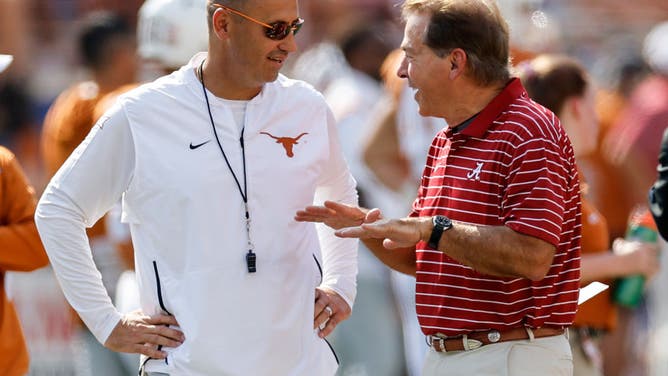Oklahoma-Texas Early Arrival Means SEC Will Have To Speed Up Process On Significant Schedule Changes In Near Future
The early move for Oklahoma and Texas to the SEC has suddenly put a new spotlight on the conference and its decisions for the future. Moves that some thought would still be two years away are now being expedited, including how the conference handles its football scheduling.
Even though the SEC has been preparing for the arrival of Oklahoma and Texas over the past two years, it's still going to take time to get accustomed to new scheduling. I'm not talking about the teams though, I am thinking of the fans. Those hatred-filled rivalries might not be on the calendar every season, even if the conference is looking to please all sixteen fan bases.
Expect The SEC To Look At Its Non-Conference Scheduling
For a team like the Texas Longhorns, they will keep their non-conference game with Michigan, which was part of the deal to get them out of the Big 12. But, what does this mean for future scheduling in regards to teams already part of SEC? Well, it's simple for a school like Tennessee, which had to cancel its future game with Oklahoma in Norman. Don't worry though, I'd imagine the conference will match these teams up early in the 16-team league schedule.

NEW ORLEANS, LOUISIANA - SEPTEMBER 04: Quarterback Jordan Travis #13 of the Florida State Seminoles throws a pass against the LSU Tigers at Caesars Superdome on September 04, 2022 in New Orleans, Louisiana. (Photo by Chris Graythen/Getty Images)
But future scheduling will have to been shaken up. When the league decides to go to a nine-game conference schedule, some schools will have to cancel future non-conference games. This means those games against FCS opponents or another FBS school will have to be canceled. The question is how much the SEC will help with those contracts, which many schools already have in place for future games. Some G-5 school athletics director is going to get a phone call from an SEC AD needing to get out of the game.
Let's not forget that each head coach is looking for a game or two that will help with bowl eligibility.
A 9-Game Conference Schedule Will Affect SEC Rivalries
The scheduling overhaul is coming, and it needs to be pretty quick. One of the hot-button topics at last year's SEC Spring meetings, besides Jimbo Fisher and Nick Saban, was the nine-game schedule. Now, as we inch closer to July 1, 2024, the decision needs to be made in the very near future. Most likely, this will come during the Spring trip to Destin, with coaches, Presidents and ADs voting to implement the new format.

AUSTIN, TEXAS - SEPTEMBER 10: Head coach Steve Sarkisian of the Texas Longhorns talks with head coach Nick Saban of the Alabama Crimson Tide before the game at Darrell K Royal-Texas Memorial Stadium on September 10, 2022 in Austin, Texas. (Photo by Tim Warner/Getty Images)
After this happens, we'll start to see which rivalry games will be impacted in the future. Each school would get three permanent opponents, while the other six games are rotated. A school like Auburn will most certainly keep its matchups against Alabama and Georgia. While others will have to put a few names in a hat, looking to keep some rivalries alive.
Will LSU play Auburn or Arkansas every year? There's a good chance that one of those games will vanish from the yearly schedule.
Here's one example of what this could look like, in regards to permanent opponents: Alabama could play LSU, Auburn and Tennessee every season, using the other six games to fill out its SEC schedule.
Since joining the SEC in 2012, Texas A&M and Florida have only played each other four times in 11 years. Now, a new scheduling format could allow these two schools to play on a more frequent basis.
Georgia isn't giving up the game against Florida, while Tennessee will have to decide which rivalry it prefers on a yearly basis. There won't be games against Florida, Georgia and Alabama on the permanent schedule for the Vols. What we will most likely get is Texas versus Texas A&M every season, along with the 'Red River Shootout' against Oklahoma.
SEC-ESPN Getting Texas, Oklahoma In First Year On Contract
The television rights deal that ESPN and the SEC agreed to will give teams multiple platforms, obviously. The agreement will see the SEC take up the primetime 7 p.m. slot on ABC, while the rest of ESPN's channels will give better options for kickoff times. While we pour one out for the beloved SEC on CBS 3:30 game, look for ESPN to counter with the Big 10 in that same time slot. The infamous intro music will be gone, but the time slot will remain the same.
The key point in all of this is that the marquee game of the day will now, most likely, be played at night. In the past, CBS has been able to pick two weekends for a doubleheader, which usually involved the Alabama-LSU game. The biggest takeaway from the new TV deal is that ESPN will have the option to choose which game it decides to put up against the Big 10 or ACC, not having to go with the premier matchup of the weekend in the afternoon.
This is just the start of a conversation that will certainly bring a number of different arguments to the table from member schools. Some will hate their permanent games, while others will have to oblige. But, the positive takeaway from the new additions will center around not having to wait five or six years to see a certain matchup.
If the SEC is smart, and I know they are, we're on-track to see schedules that benefit each member school, with the revenue to follow. The conversation has been ongoing behind the scenes for a while, with a lot of room for arguments to be made over the next few months.
The SEC cannot drag their feet on this and wait to make a scheduling decision. All eyes are will be on Destin and the Spring meetings, again.